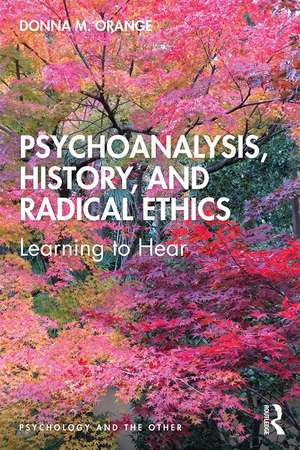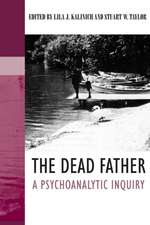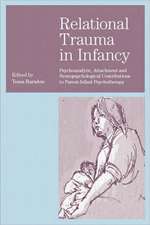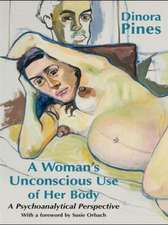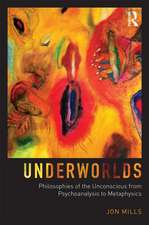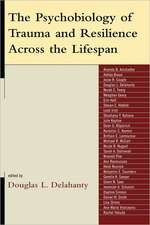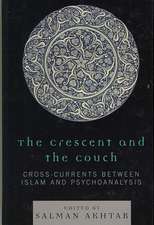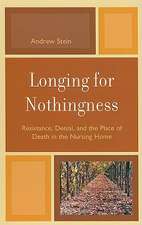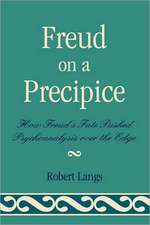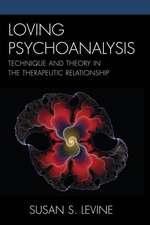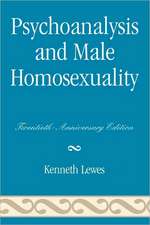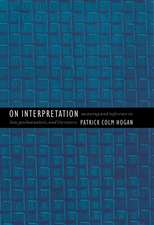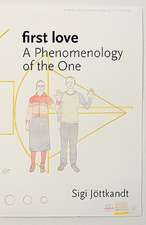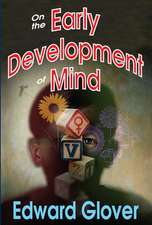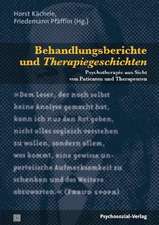Psychoanalysis, History, and Radical Ethics: Learning to Hear: Psychology and the Other
Autor Donna Orangeen Limba Engleză Paperback – 17 oct 2019
Psychoanalysis, History, and Radical Ethics: Learning to Hear explores the importance of listening, being able to speak, and those who are silenced, from a psychoanalytic perspective. In particular, it focuses on those voices silenced either collectively or individually by trauma, culture, discrimination and persecution, and even by the history of psychoanalysis. Drawing on lessons from philosophy and history as well as clinical vignettes, this book provides a comprehensive guide to understanding the role of trauma in creating silence, and the importance for psychoanalysts of learning to hear those silenced voices.
| Toate formatele și edițiile | Preț | Express |
|---|---|---|
| Paperback (1) | 272.75 lei 6-8 săpt. | |
| Taylor & Francis – 17 oct 2019 | 272.75 lei 6-8 săpt. | |
| Hardback (1) | 1030.87 lei 6-8 săpt. | |
| Taylor & Francis – 8 oct 2019 | 1030.87 lei 6-8 săpt. |
Din seria Psychology and the Other
- 5%
 Preț: 268.68 lei
Preț: 268.68 lei -
 Preț: 280.84 lei
Preț: 280.84 lei - 5%
 Preț: 204.81 lei
Preț: 204.81 lei - 5%
 Preț: 272.19 lei
Preț: 272.19 lei -
 Preț: 244.88 lei
Preț: 244.88 lei - 5%
 Preț: 232.46 lei
Preț: 232.46 lei -
 Preț: 245.07 lei
Preț: 245.07 lei -
 Preț: 245.18 lei
Preț: 245.18 lei - 5%
 Preț: 334.23 lei
Preț: 334.23 lei - 5%
 Preț: 333.26 lei
Preț: 333.26 lei - 5%
 Preț: 303.00 lei
Preț: 303.00 lei - 5%
 Preț: 326.06 lei
Preț: 326.06 lei -
 Preț: 336.11 lei
Preț: 336.11 lei -
 Preț: 389.38 lei
Preț: 389.38 lei -
 Preț: 332.06 lei
Preț: 332.06 lei - 5%
 Preț: 202.94 lei
Preț: 202.94 lei - 5%
 Preț: 328.45 lei
Preț: 328.45 lei - 5%
 Preț: 331.08 lei
Preț: 331.08 lei - 5%
 Preț: 293.69 lei
Preț: 293.69 lei
Preț: 272.75 lei
Nou
52.20€ • 54.29$ • 43.09£
Carte tipărită la comandă
Livrare economică 15-29 aprilie
Specificații
ISBN-10: 0367339307
Pagini: 192
Dimensiuni: 156 x 234 x 22 mm
Greutate: 0.36 kg
Ediția:1
Editura: Taylor & Francis
Colecția Routledge
Seria Psychology and the Other
Locul publicării:Oxford, United Kingdom
Public țintă
Postgraduate, Professional, and Professional Practice & DevelopmentCuprins
Chapter 1: Silence in Phenomenology: Dream or Nightmare?
Chapter 2: Violence, Dissociation, and Traumatizing Silence
Chapter 3: This is not Psychoanalysis!
Chapter 4: The Seduction of Mystical Monisms in the Humanistic Psychotherapies
Chapter 5: Reading History as an Ethical and Therapeutic Project
Chapter 6: Radical Ethics: Beyond Moderation
Chapter 7: Ethical Hearing: Demand and Enigma
Afterword
Appendix: Open acknowledgement and apology by the International Association for Analytical Psychology (IAAP) concerning C.G. Jung’s attitudes to and writings on persons of African heritage.
Notă biografică
Recenzii
""I listen therefore I am." With hearing impaired, one-sided, how does an "I" take its place in a world of others? Using her own life as such an experiment in nature, Donna Orange openly, poignantly, and brilliantly explores the development of individuality and intersubjectivity, the essence of what it means to be a person. A leader recognized around the world for using psychoanalysis to explore the central questions of philosophy, Orange now brings fresh emotional immediacy and depth of serious thinking to the subject. This is a work of substantial significance, at once a beautiful literary memoir and a contribution of substantial significance." --Warren S. Poland, M.D., has practiced clinical psychoanalysis for over 50 years and is the former editor of the JAPA Review of Books
"In Learning To Hear, Orange continues her ethical quest. Entwining history, philosophy and psychoanalysis, she exhorts us towards a mission of ethical hearing. For Orange, ethical hearing is distinct from agentic 'listening' - it is a receptivity to the speech and silence that has been kept in the shadows. This book humanizes its subject, and is an important contribution to the social-ethical turn in psychoanalysis." --Sue Grand, PhD, has been practicing couples, family, and individual therapy for over 40 years
"In this extraordinary book, Donna Orange helps us hear with our hearts. She challenges us to attend to those silenced by oppression, prejudice, violence, poverty, and other cruelties. This book is essential reading for the neophyte as well as the seasoned clinician, striving to hear the suffering other, as well as the muted voices within ourselves."
--Sandra Buechler is a training and supervising analyst at the William Alanson White Institute, New York, USA
""I listen therefore I am." With hearing impaired, one-sided, how does an "I" take its place in a world of others? Using her own life as such an experiment in nature, Donna Orange openly, poignantly, and brilliantly explores the development of individuality and intersubjectivity, the essence of what it means to be a person. A leader recognized around the world for using psychoanalysis to explore the central questions of philosophy, Orange now brings fresh emotional immediacy and depth of serious thinking to the subject. This is a work of substantial significance, at once a beautiful literary memoir and a contribution of substantial significance."
--Warren S. Poland, M.D., has practiced clinical psychoanalysis for over 50 years and is the former editor of the JAPA Review of Books
"In Learning To Hear, Orange continues her ethical quest. Entwining history, philosophy and psychoanalysis, she exhorts us towards a mission of ethical hearing. For Orange, ethical hearing is distinct from agentic 'listening' - it is a receptivity to the speech and silence that has been kept in the shadows. This book humanizes its subject, and is an important contribution to the social-ethical turn in psychoanalysis."
--Sue Grand, Ph.D., has been practicing couples, family, and individual therapy for over 40 years
"Grounded in philosophical depth, the book provides several ideas of how we can address our responsibilities in a concrete way. The book is likely to be helpful to all counsellors and psychotherapists, however experienced, who wish to take seriously the ways in which they are silencing their clients or supervisees. The ideas may help trainers to reflect more deeply on training content and on their responses to trainees."
--Emily Taylor, Transformations Book Reviews
Descriere
Psychoanalysis, History, and Radical Ethics: Learning to Hear explores the importance of listening, being able to speak, and those who are silenced, from a psychoanalytic perspective. In particular, it focuses on those voices silenced either collectively or individually by trauma, culture, discrimination and persecution, and even by the history of psychoanalysis. Drawing on lessons from philosophy and history as well as clinical vignettes, this book provides a comprehensive guide to understanding the role of trauma in creating silence, and the importance for psychoanalysts of learning to hear those silenced voices.
